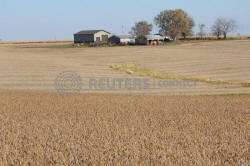|
Chinese commercial crushers have bought up to 7 cargoes of
American soybeans this week for December and January shipment
thanks to competitive U.S. prices versus South American prices
and good crush margins in China, said two traders familiar with
the matter.
"At least two cargoes and as many as five were sold for December
and January shipment on Tuesday," one of the traders said.
The new purchases come at a time of confusion over payments of
extra duties for U.S. shipments booked under a tariff-free quota
system remained, the two traders said.
Last week, state-owned crusher Jiusan Group, agreed to pay about
60 million yuan ($8.58 million) of tariffs as deposit for one
cargo of U.S. soybeans after facing delays to offload due to a
dispute over payment of tariffs with local authorities.
Almost all the beans clogging the ports were destined for state
reserves, and were bought by Sinograin and COFCO during a truce
in the festering Sino-U.S. trade war, according to one of the
traders and another source at a state-owned firm.
Some of the ships carrying the U.S. cargoes have been anchored
outside Chinese ports for almost a month, according to Refinitiv
data.
Sinograin and COFCO had not responded to faxes seeking comments.
"Storage for state reserves is limited. These beans can only go
into certain warehouses, usually those close to a crushing plant
under Sinograin, said a fourth source familiar with how the
state reserves works.
He added that the older beans would be moved out for crushing
when new beans were brought in for the reserves' stockpile.
"Beans booked for the reserves usually can't be sent to crushing
provisionally," the source said.
China bought about 14 million tonnes of U.S. soybeans from
December as part of the truce in the trade spat between the
world's top two economies, at least 7 million tonnes of which
were going into the reserves.
Despite the stockpiler's struggle to find room for the beans,
some Chinese commercial crushing plants have already suspended
operation due to a shortage of beans, according to Xie Huilan,
an analyst with Cofeed, an agribusiness research firm.
(Reporting by Hallie Gu and Karl Plume, Editing by Shivani
Singh, Robert Birsel)
[© 2019 Thomson Reuters. All rights
reserved.] Copyright 2019 Reuters. All rights reserved. This material may not be published,
broadcast, rewritten or redistributed.
Thompson Reuters is solely responsible for this content.

|
|





